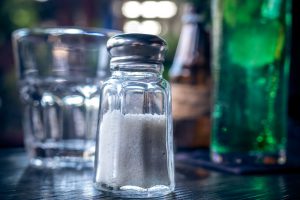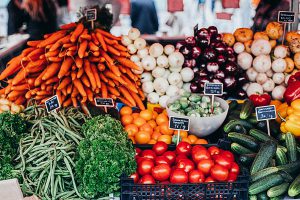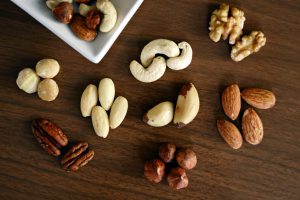Usually we are unaware of how much salt we consume in a day. Around 75% of the things we eat already have salt in it, even things like bread, and cereal. It is important to keep an eye on our salt intake in order to prevent any serious health conditions. High sodium intake can cause high blood pressure, water retention, and can lead to heart disease. Everything is good in moderation, and salt is no different. The problem is that most of us do not realize exactly how much salt we consume or what to do about it. We have compiled a few helpful tips to help you keep track of how

much salt you are actually eating, and how to cut down if you realize you’re getting way too much!
Cooking
When cooking, we throw in a handful of salt or a pinch here and there out of habit. Sometimes the amount of salt we add is a lot more than needed and in the long run will hurt our bodies. There are many different seasonings that can be used to bring flavor to our food that are not as harmful to your health and help cut down on salt. Fresh herbs can be used on vegetables and meat such as garlic and ginger, both are beneficial to your health. Ginger and garlic can lower your blood pressure, fight infections, help you lose weight, and is anti-inflammatory.
Shopping
When you are out shopping for foods, it is important to check the milligrams of sodium on label. Compare labels and try to cut the salt by choosing cereals, condiments, and snacks that have lower salt. Ham and packaged meats can be high in salt, as well as fish, so try to stay away from them as much as possible, go for the fresh options instead. Canned foods and sauces can be high in sodium too, so keep an eye on those as well. Buying products with less salt doesn’t necessarily mean less taste. Fresher ingredients give you the opportunity to adjust ingredients, try new flavors, and experiment with new cooking styles introducing you to meals you may not have tried before, and giving you body a much better balance of nutrients.
Eating Out
A lot of food that is made at restaurants or fast food places can be full of sodium because they are made of frozen and ready made ingredients. When eating out try to opt for a fresh salad, this is much better for your digestive system, has less frozen ingredients, and will cut down on the amount of unnecessary chemicals and sodium you are taking in. Even salads can have unnecessary amounts of salt if you are not careful, be mindful of salad dressings, and extra toppings they can be full of salt and fat. If you feel the need for pasta or a burger, there are ways to make it healthier. You can limit the condiments on burgers that are full of salt, and stick to cheese and vegetables. With pasta, choose a healthier tomato sauce instead of alfredo, and add vegetables to the pasta. If ordering a sandwich, go for something

other than ham because it is generally full of salt, try something like grilled chicken with vegetables.
Our kidneys have a hard time trying to keep up with the amount of salt we take in on a daily basis. The body ends up holding the water in, increasing blood volume, which in the end forces our hearts to pump harder. Over time, the work the heart has to put in can lead to high blood pressure, heart attack, and stroke. High blood pressure is the leading cause of heart disease. It is very important to examine the our salt intake every day to avoid these issues. All it takes are a few simple switches to turn a high sodium meal into a healthier choice, and we do not have to miss out on flavor while doing so. We only have one heart, so we should try to keep it as healthy as possible.






